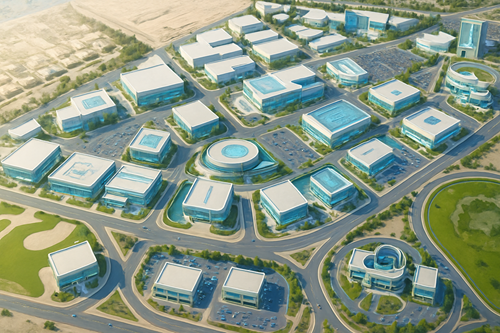Deep-Tech Startups: fueling global innovation
/DTVC.png)
Distinguished from traditional technology ventures by their reliance on cutting-edge scientific research and high-tech engineering, deep-tech startups are driving breakthroughs in artificial intelligence, energy systems, advanced materials, and biotechnology. Their ability to translate scientific discovery into practical solutions positions them as key enablers of economic competitiveness and sustainable development worldwide.
Yet, while their potential impact is immense, deep-tech startups face distinct challenges compared to their counterparts in software or digital services. They require longer development timelines, higher upfront capital, access to world-class research infrastructure, and close collaboration with academia and industry. To thrive, they depend on robust ecosystems that bring together research institutions, corporations, investors, and policymakers.
Around the world, we see how such ecosystems are evolving to meet these needs. In Europe, for example, initiatives under Horizon Europe, EU’s key funding programme for research and innovation, are channeling funding and support to deep-tech projects addressing climate change and digital sovereignty. In Asia, hubs in Singapore and Shenzhen are pioneering collaboration in advanced manufacturing and green technologies. Similarly, in the U.S., the growing number of university-linked accelerators highlights the importance of academic-industry synergies.
The Middle East is also stepping into this global movement, positioning itself as an emerging hub for science-driven innovation. Governments across the region are making strategic investments in technology to diversify their economies, build knowledge-based industries, and attract global talent.
In particular, Saudi Arabia is making deep investments to accelerate its innovation economy. In the first half of 2025, startups in the Kingdom attracted 64% of all funding raised across MENA, reflecting a 342% surge compared to 2024. The country also emerged as MENA’s most funded market in Q2 2025, with US $231.5 million invested across 38 Saudi startups, further reinforcing its leadership in the region.
This broader funding momentum was underscored in a report released earlier this year by the Ministry of Communications and Information Technology in Saudi Arabia. The report highlighted that the country’s deep-tech scene was already showing measurable momentum: more than 43 high-growth startups have collectively raised over $987 million in funding, with nearly half focused on AI and IoT.
Within this landscape, Dhahran Techno Valley (DTV) stands out as a flagship ecosystem. Anchored by King Fahd University of Petroleum and Minerals (KFUPM), DTV brings together global energy leaders, local startups, and R&D centers under one roof. Looking ahead, it has set a target of nurturing 160 deep-tech startups by 2027, further signaling Saudi Arabia’s ambition to become a regional and global hub for science-based entrepreneurship.
But ecosystems are not just about infrastructure; they are also about purpose. Deep-tech startups are often mission-driven, addressing critical needs in fields such as renewable energy, carbon reduction, water security, and digital transformation. Whether in Europe, Asia, North America, or the Middle East, their success depends on the strength of the networks that support them.
As we look toward the future, the success of deep-tech startups will depend on the strength of the ecosystems that support them. By combining academic excellence, industry partnerships, and government vision, innovation hubs demonstrate how regions can create fertile ground for scientific entrepreneurship.
---
Dhahran Techno Valley is Dragon Sponsor of IASP 2025 Beijing
/)


/canvascolor(0xffffffff)/MemberLogo-5594-6012.jpg)
/canvascolor(0xffffffff)/UNIVERSITY_LOGO_page1_image1_1.jpg)
/canvascolor(0xffffffff)/IMG_9722.jpg)
/canvascolor(0xffffffff)/logo_en_UNESCO_2nd_combination.png)
/canvascolor(0xffffffff)/KSU_MasterLogo_Colour_RGB_copy_2_6.png)
/canvascolor(0xffffffff)/zone_logo_rgb_3_1.jpg)
/canvascolor(0xffffffff)/2025_07_08_Kazakhstan_Astana_Business_Campus.png)
/canvascolor(0xffffffff)/2017_08_07_Pando.png)
/canvascolor(0xffffffff)/_______logo_1.png)
/canvascolor(0xffffffff)/MemberLogo-5557-5966.jpg)
/canvascolor(0xffffffff)/MemberLogo-79604-5902.jpg)
/canvascolor(0xffffffff)/MemberLogo-89401-462801.jpg)
/canvascolor(0xffffffff)/2017_08_04_Gararia.png)
/canvascolor(0xffffffff)/2025_09_16_Sweden_Medeon_SP.png)
/canvascolor(0xffffffff)/2017_10_31_Spain_Fundacion_Comunitat_Valencian.jpg)
/canvascolor(0xffffffff)/Cyan_horizontal.png)
/canvascolor(0xffffffff)/tps.JPG)
/canvascolor(0xffffffff)/ZGC_Group_SP_logo_1.png)
/canvascolor(0xffffffff)/2017_08_04_fundecyt-pctex-h.png)
/canvascolor(0xffffffff)/2022_01_26_Italy_NOI.jpg)
/canvascolor(0xffffffff)/PCT-GUAM_-LOGO-NORMAL_1.png)
/canvascolor(0xffffffff)/2017_10_24_Morocco_Technopark_Morocco.JPG)
/canvascolor(0xffffffff)/logo_2_(para_rodape_)_1.png)
/canvascolor(0xffffffff)/2017_07_26_China_TusHoldings_TusPark.png)
/canvascolor(0xffffffff)/IEC_Logo.png)
